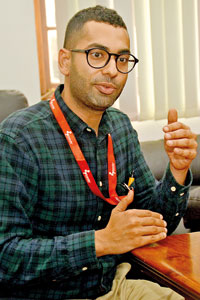The Right to Read a collaborative initiative by the Ministry of Education
View(s):
Assad Omar
The Sunday Times Education Team was happy to have a candid chat with the Minister of Education, Prof. G L Peiris on the new partnership between Brandix’ non-profit initiative and the Ministry of Education to improve the English literacy of students in schools.
Prof. G L Peiris noted that this initiative is to enhance the employability of Sri Lankan students, where English is a skill which will facilitate employment.
Education and Employability
According to the Minister, “it is not that there are no employment opportunities, but it is the gap of education received and the lack of employability skills” which causes the strain on finding jobs. Prof. Peiris noted that this initiative between the private sector and the Ministry of Education is bound to create a huge difference honing the English literacy skills of the students.
He referred to English being known as a kaduwa (sword), causing enormous disparities and resentment between students after the insurrections that Sri Lanka faced. He noted that “the Swabasha counterparts may have equal or more knowledge as students who have high English proficiency, but miss out on opportunities. This causes resentment towards the system.”
Prof. Peiris noted that this project will benefit the students in such a way that it will open a wealth of knowledge previously inaccessible to them due to the language proficiency, as most literature on higher education is available in English.
“English therefore is a gateway to access knowledge in many
different fields”
He went on to note that the “Right to Read addresses the imbalance which the current system of education has and is of pivotal importance” to the future of this country.
Smart Classrooms – The Right to Read
The vision of Brandix for their Right to Read initiative is to be able to have every Sri Lankan equally fluent and proficient in English by the year 2022. In order to move forward with this project a non-governmental organization has been established and the initiative is carried out through this body.
To do this an app has been developed, which has been tried and tested in several countries, which is capable of registering up to 8 million students. According to the Brandix representative, the metrics which measured the users progress noted 30% – 50% of improvement within 75 days of usage.
The app is now being used by 616 schools where 344,297 students are learning English digitally.
The private sector is leveraging the infrastructure in the schools, training centers and support centers made available by the Ministry of Education to facilitate the deployment of the app and it’s hardware. These centers have also been set up for the training of teachers, to guide them on how the app and its hardware can be utilized in teaching the students.

Minister of Education, Prof. G L Peiris
According to the estimates by the Right to Read team, there are 13, 194 schools in Sri Lanka, out of which 30% of the schools have the necessary hardware for the app and it’s equipment to be installed in the schools.
The hardware required for the app and for the function of the lessons, is a smart board or a projector with a desktop which has an operating system compatible with the app. For the schools which lack the basic hardware facilities, the Right to Read initiative invests in smart boards.
Training the Teachers
The team of Right to Read trains the Master trainers appointed by the Ministry of Education, and allocates one master trainer to guide the teachers in five to ten schools in their respective region.
Further, the representative of the project went on to note that the main focus of this app is to get the students to read, and through this build their confidence. The teachers will be trained to operate the app, help the students in gaining confidence through reading, thereby encouraging the students to speak.
After the basic stage of learning how to maneuver the app, the teachers will then be trained on how students are to be tested for their knowledge and ability of speech, comprehension and writing.
How the App Works
The app will be installed in the hardware, and in it the digital version of the relevant textbooks and guides approved by the Ministry of Education which is required for the students to learn will be available. The computer generated audio will guide the students in reading with the correct pronunciation and grammar, thereby instilling the confidence required for them to use the ‘sword’ which was previously looked at with hostility.
Further elaborating on the functionality, the app does not require the internet to conduct the lessons, as the contents of the books and the audio, visual components are preloaded onto the app. Once the app is installed using the internet, the facility is not required.
Currently the app has been deployed at schools in Sabaragamuwa, Northern,
Uva and Central provinces.
Hope, and The Way Forward
Prof. Peiris noted that “the students lack nothing in terms of intellectual sensitivity and perception, as the process through which the students get into Universities in Sri Lanka is a highly competitive process” He added that “what they lack is the means or equipment to make the most of the talents they possess.”
He then added that according to the Former Prime Minister of Singapore Lee Kuan Yew, the only thing that will prevent us from being left behind in the world is the knowledge of English. He notes that this is the norm in the world in which we live in, as English is the language of commerce and therefore this project will make a significant impact on everyone.
He added that in addition to this initiative the Ministry of Education has plans to improve the education system in different paths, and one which he highlighted was the revisiting of the curriculums taught in the schools, as it needs reform to suit the changing times of the world.
Prof. G L Peiris noted that reforms will focus on improving the intellectual curiosity, analytical and creative capabilities of the children as currently the purpose of education seems to be directed in the path of remembering information and the capability of reproducing this information, and that this needs to be changed.
In the end of the discussion it was mutually agreed by Prof. G L Peiris and the representative of The Right to Read project that, giving the students equal opportunity by making them proficient in English will lead to many children hoping and dreaming of endless possibilities that they can achieve without the restrictions they thought they were bound by and open the gates of employability anywhere in the world. To support the initiative and for more information contact – AssadO@brandix.com
- Devuni Goonewardene


